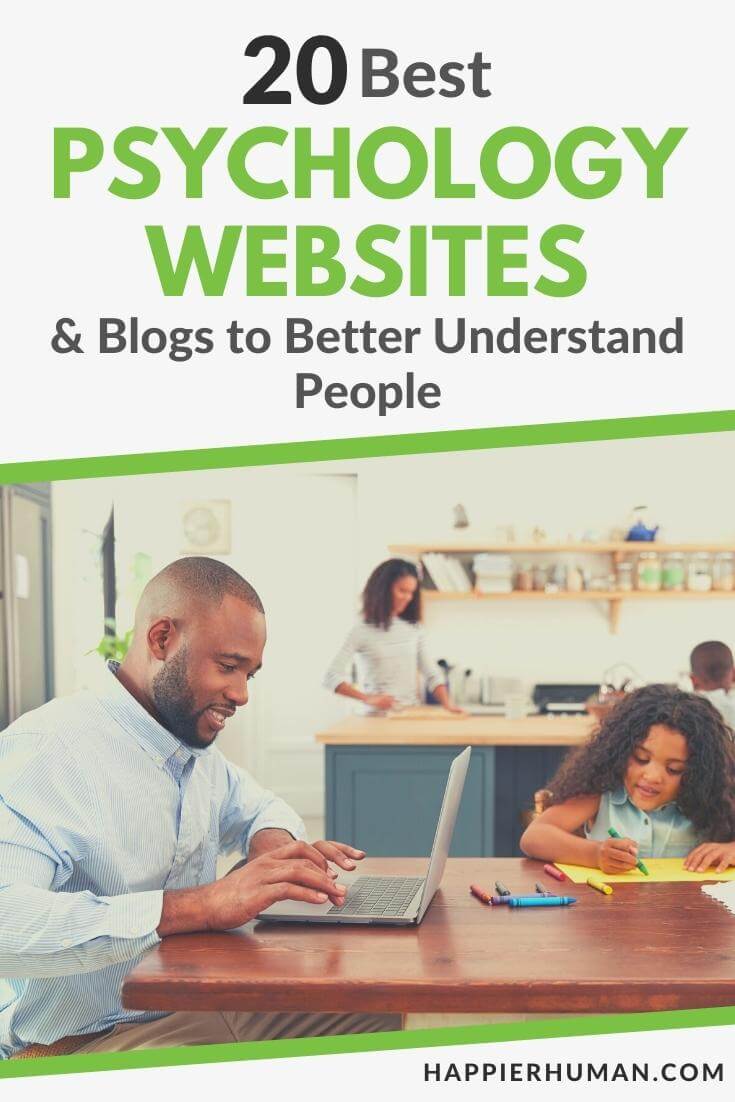Interested in psychology and looking for the best psychology websites and blogs to check out?
Psychology is one of the most interesting branches of science, as it covers the human mind and behavior. It is a multifaceted discipline with lots of sub-fields, so it is no surprise that lots of people want to learn more about it. After all, one of the best ways to achieve ultimate happiness is to learn and understand how the mind works and how it affects our daily lives.
In this post, we have gathered the best psychology websites and blogs that can help you better understand yourself and the people around you. These blogs and websites are sure to teach you a lot!
Let’s check them out!
1. Psychology Today
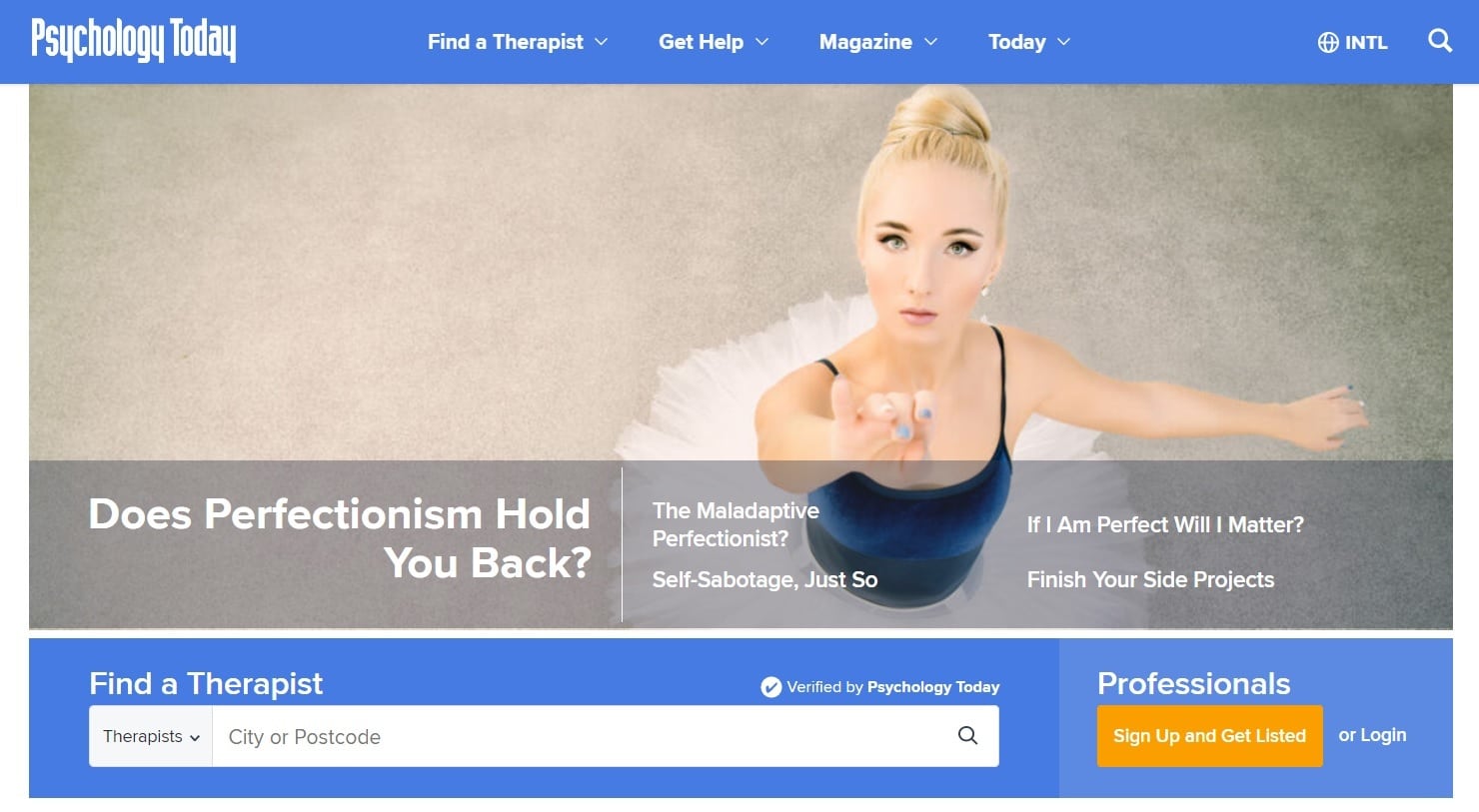
Psychology Today is a blog and magazine that compiles different articles and scientific research from several experts in the field. It gathers contributions from renowned psychologists, psychiatrists, writers, and members of the academe to collect all their expertise in one single platform.
First launched in 1967, the website and magazine have a rich history. Even after all this time, it still remains one of the most successful organizations focused on providing information about people’s health and behavior. It covers topics ranging from the “self” to your relationship with other people.
If you browse through the site’s pages, you will find a number of articles that talk about how to cope with psychological challenges. There are also posts regarding how to deal with life on a daily basis, and how to understand the different kinds of mental illnesses. Moreover, there is a search engine where you can find a therapist within your area.
2. Mind Hacks
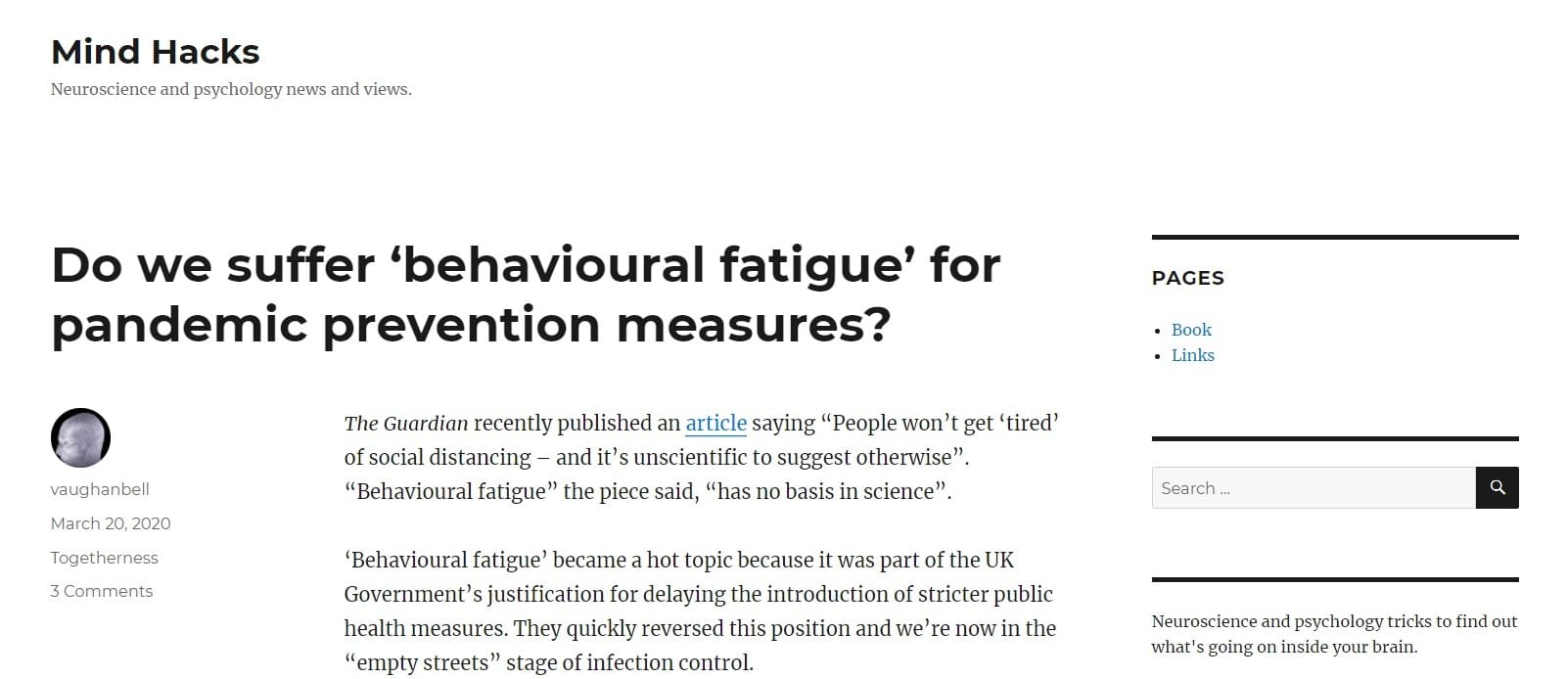
Mind Hacks was originally a book about neuroscience and psychology. It was written by Tom Stafford and Matt Webb, and published by O’Reilly. The Guardian called it “fascinating” and Blogcritics said it was a “rewarding mind trop that stretches the boundaries of what we know.”
The blog version of Mind Hacks continues to share the author’s musings with the world. Similar to the book, it is a “collection of probes into the moment-by-moment workings of our brain.” It seeks to help people understand themselves better by learning what makes people think and tick.
Stafford and Webb cover a variety of topics in this blog, including psychology news, book reviews, and relevant videos connected to psychology. If you visit their blog and read an article or two, you might just find yourself hooked, as their writing style is very articulate and persuasive. The blog is also regularly updated, so there is always fresh content.
If you are looking for a psychology website that is easy to read and understand, we recommend checking out Mind Hacks. You will learn a lot about how the brain actually works and why we behave the way we do.
3. Psych Central
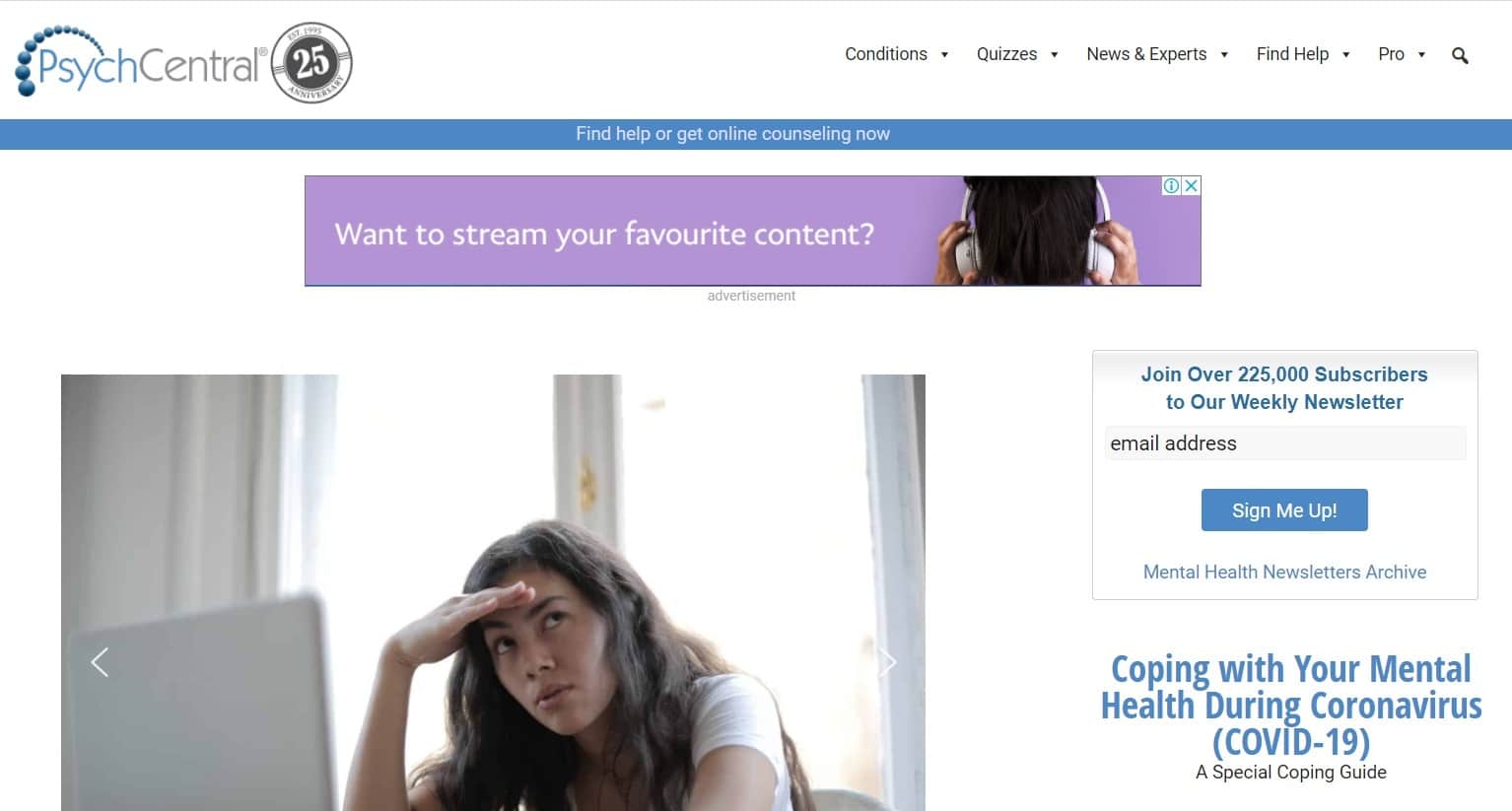
Psych Central claims to be the internet’s “largest and oldest independent mental health online resource.” It was established in 1995, and has helped a lot of groups and individuals with psychological needs live happier, healthier lives.
This website’s goal is to spread mental health awareness through the use of modern technology. It specializes in providing mental health information and emotional support to psychologically challenged individuals, and helps society understand what mental health is.
Psych Central provides tons of features to help you understand mental health better. In addition to the usual articles and mental health information, it also has editorial submissions and news releases to keep you updated on psychology trends. Furthermore, it has mental health quizzes that can help you identify your mental health issues.
Psych Central is a family-owned website managed and operated by Dr. John Grohol. It is affiliated with the Psych Central Community Connection, an organization that focuses on helping individuals in need of psychological and medical treatment.
4. Positive Psychology
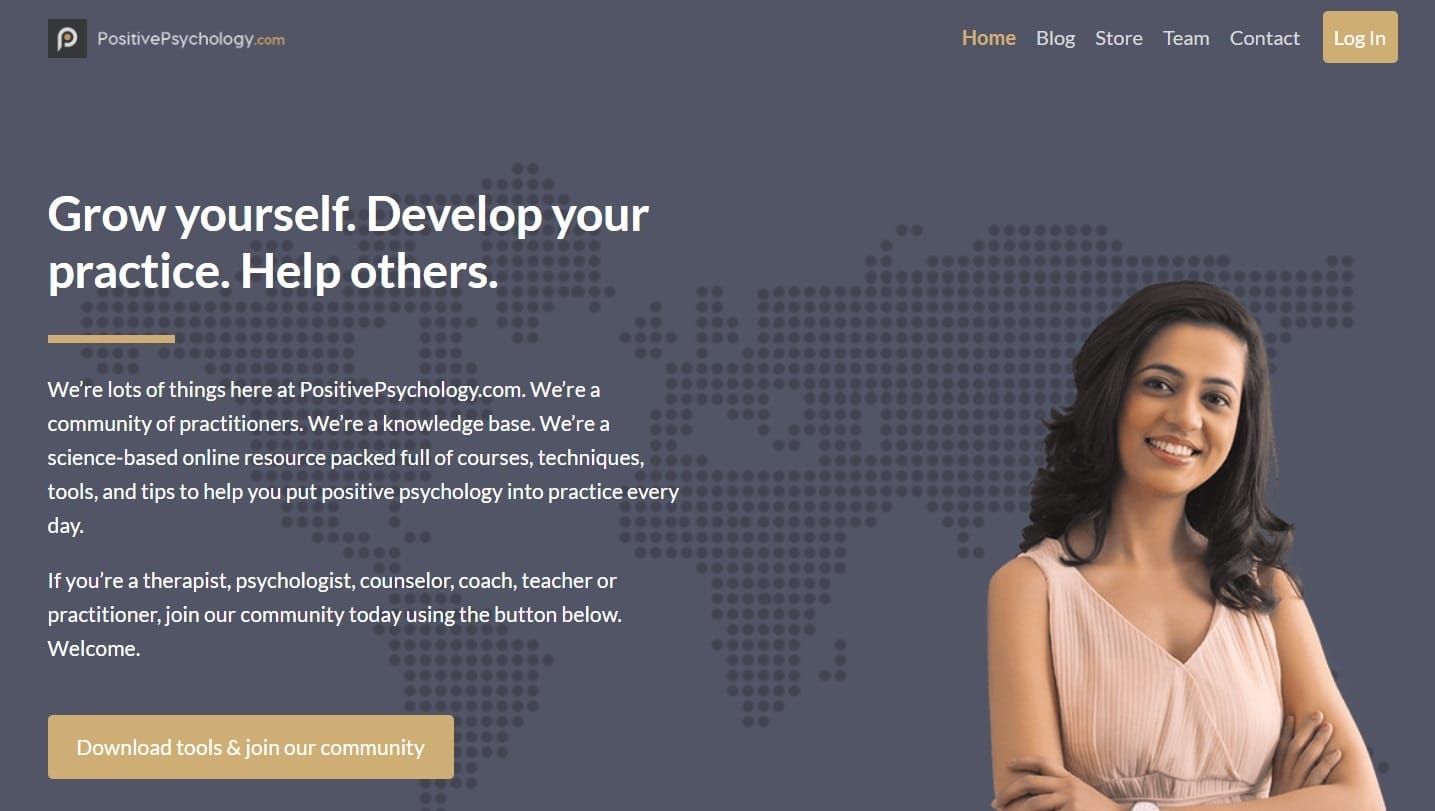
Founders Seph Fontane Pennock and Hugo Alberts had one thing in mind when they started Positive Psychology: to help people understand positive psychology and how to apply it to their everyday lives. They aim to spread awareness about how positive psychology works and how it can create a significant difference in people’s lives.
The Positive Psychology website seeks to empower individuals by providing them with the tools they need to practice positive psychology. Its content usually revolves around practical, competent, and evidence-based resources that explain the whys and hows of this particular field.
Moreover, as part of its goal to build and nurture a global community of positive psychology professionals and practitioners, the site is open to questions you may have regarding the subject. Pennock and Alberts believe that, through this website, people can have the chance to live more joyful and meaningful lives.
If you want to learn more about positive psychology and how it can possibly make your life and the world a better place, this website is a great resource.
5. Anxiety No More
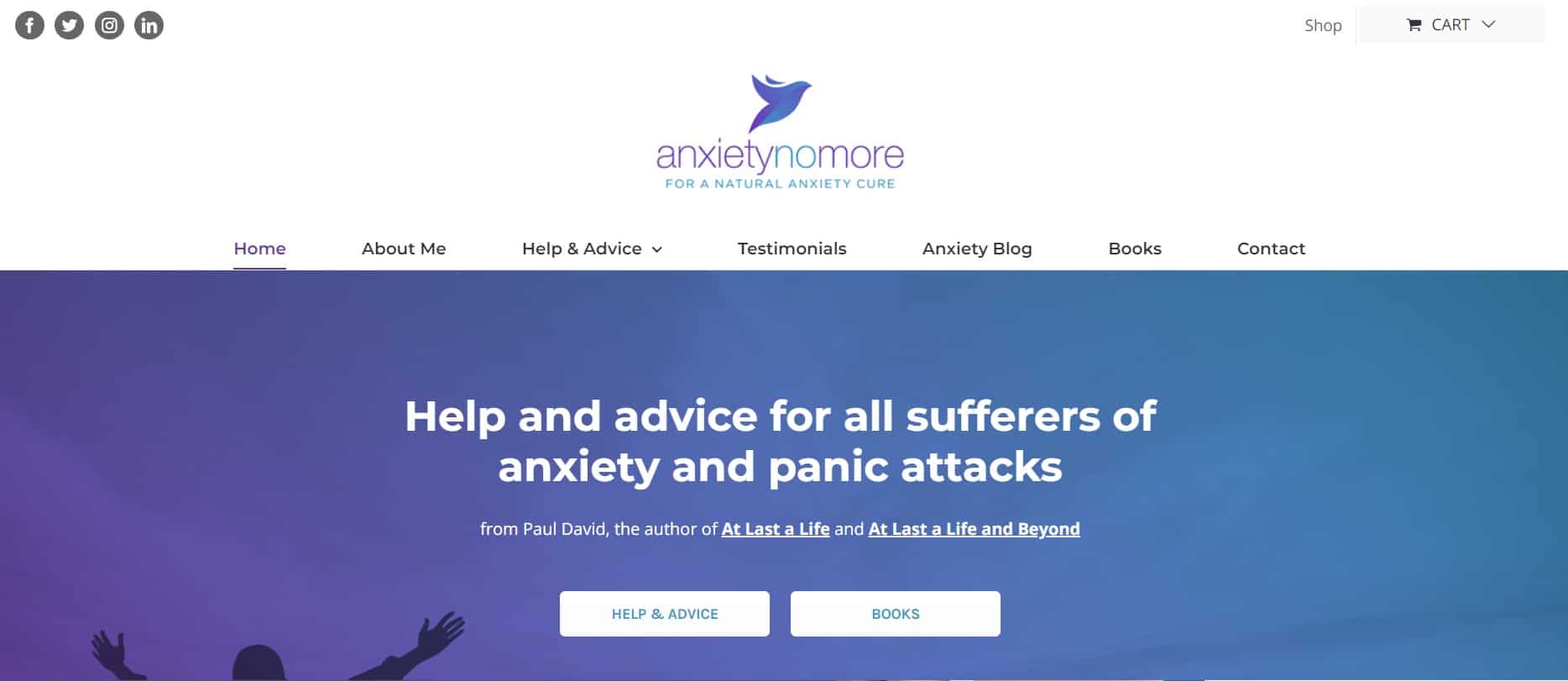
You probably know Paul David as the author of “At Last a Life” and “At Last a Life and Beyond.” He is an author and blogger who suffered from anxiety and panic disorder for almost 10 years, but was able to learn to cope through the power of self-help. In his words, he recovered from anxiety because he “refused to give up hope and left no stone unturned in finding a way out of this condition.”
His blog focuses on anxiety and many other related topics. If you want to know the reasons why most people suffer from anxiety disorders, or why anxiety brings so much pain and suffering, this blog is the place to look. By reading Paul David’s articles, you will learn a lot about anxiety and how it affects people.
But Anxiety No More blog offers more than just relevant information about mental health. If you are struggling with anxiety or any other mental illness related to it and you need initial advice on how to overcome it, there are tons of anxiety tips and guidelines to be found here. David provides step-by-step procedures to beat anxiety without sacrificing the other aspects of your life.
It is important to note that if you are experiencing panic attacks and other anxiety disorders, it is best to consult a health professional. The blog only serves as a resource and inspiration for people struggling with this particular type of mental illness.
6. Scientific American – Mind

Scientific American – Mind started in 1845 as a magazine in the United States that focused on providing information about the latest inventions and innovations in science, humanities, and technology. Today, it is no longer just a US-based magazine. It has now reached over 10 million people worldwide through the Internet.
The website is divided into several sections: science, mind, health, technology, sustainability, and a lot more. Each section is further divided into different categories. The “mind” section contains news and articles about psychology, and is further divided into “behavior and society,” “cognition,” “mental health,” “neurological health,” and “neuroscience.”
There is clearly a lot to be excited about on this website if you are a fan of science and all its branches. Of particular interest for psychology lovers, it covers topics on how the human mind works and how human behavior and physiological traits collide and interconnect with each other. It even provides tips and guidelines from experts in the field on how to deal with the human mind and society.
If you are looking for a well-established and trusted outlet where you can read and learn more about psychology and other sciences, we recommend checking out the Scientific American site.
7. Research Digest
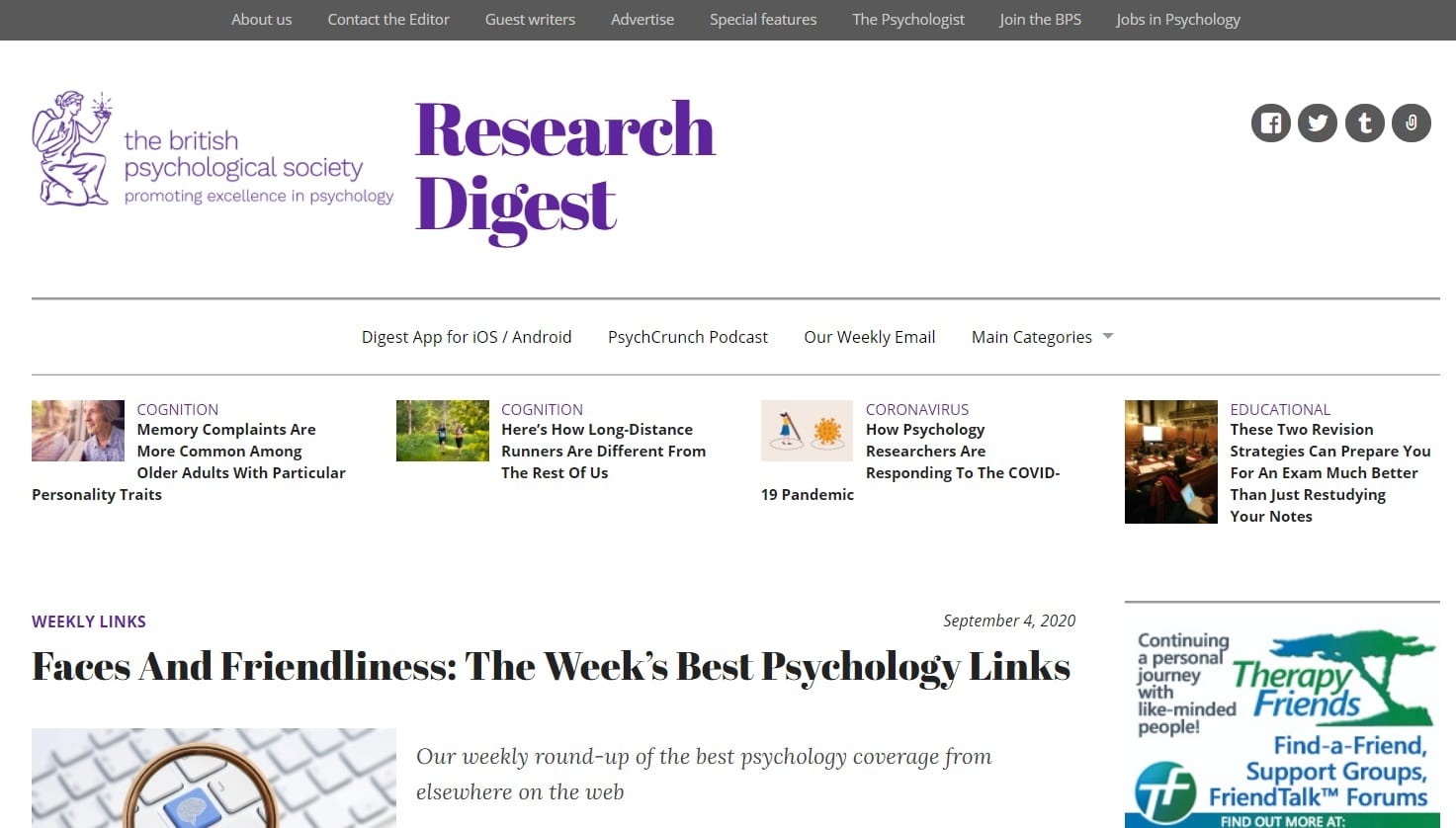
The British Psychological Society is a psychological association based in the United Kingdom that promotes excellence and ethical practice in the field of science, psychology, and the humanities. It aims to set a high standard for research and education in the field of psychology by providing well-founded policies and social events.
Research Digest is the brainchild of this organization. It was established in 2003 to help people have a better understanding of the current research and trends in psychology. Every week, it presents at least one research study. These reports are well-studied and scrutinized by a team of professional experts in the field.
When choosing studies to focus on, the team weighs how much each one can contribute to the world. Studies are picked based on relevance and substance. Other common standards include if a research is timely, novel, and thought-provoking.
We recommend checking out this site if you are fond of reading research and case studies.
8. PsyBlog
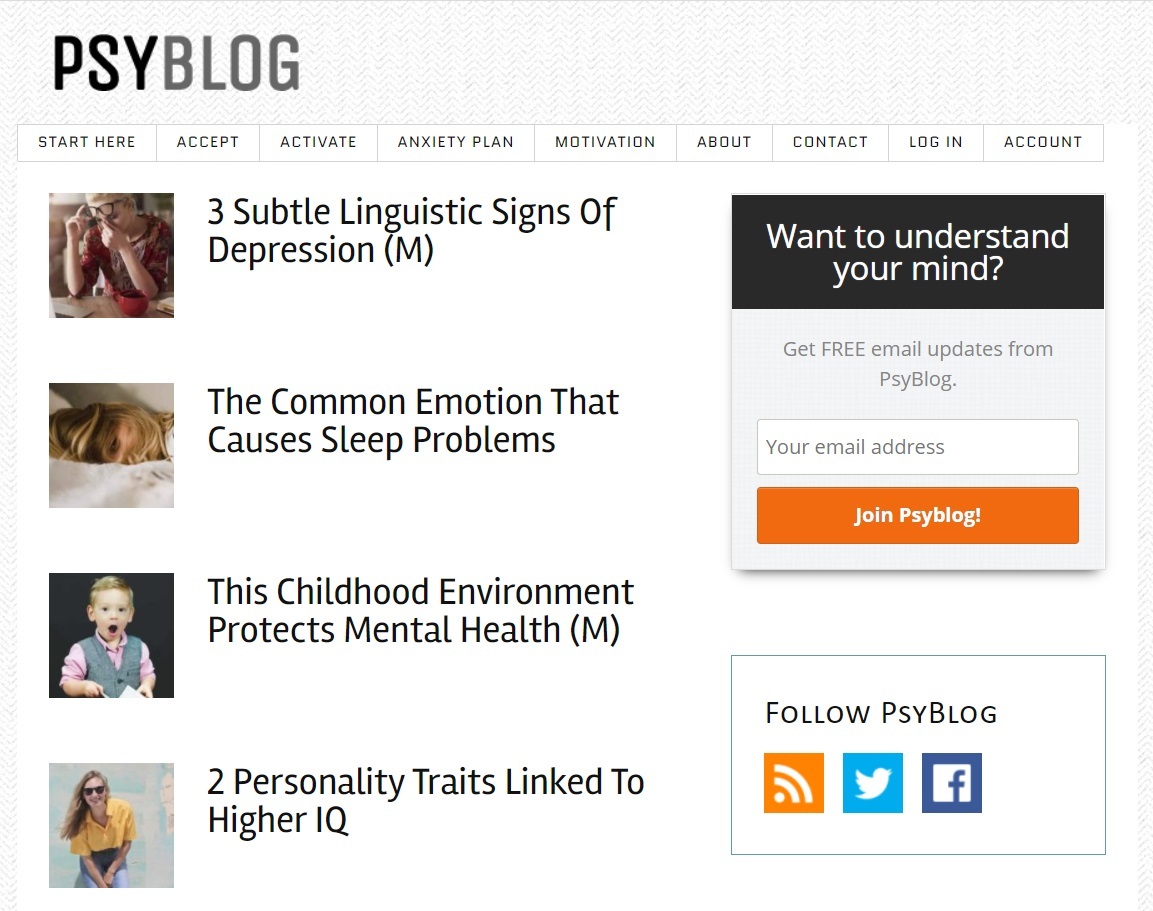
Psychology is all about the mind and how it works, and this is precisely where Dr. Jeremy Dean focuses all of his teaching and writing energy. Dr. Dean is the founder of PsyBlog and the author of several psychology and self-help books like “Making Habits, Breaking Habits” and “Activate: How to Find Joy Again by Changing What You Do.”
PsyBlog usually covers topics on self-improvement, habit changes, happiness, and mental health. It is not your usual how-to or why-is blog, as it mostly focuses on peer-reviewed research studies. Dr. Dean has a master’s degree in research methods in psychology, so he is very fond of knowledge-based articles and reports.
If you check the site, you will also find tons of articles about physical and physiological health. They are typically about how the human body reacts under different psychological states. There are also articles that are completely separate from psychology.
PsyBlog has been featured on a lot of platforms, such as BBC News, The New York Times, and The Guardian. If you are looking for a reputable blog that lives up to its promise of providing useful and noteworthy information, we recommend this one.
9. Psychiatric Times
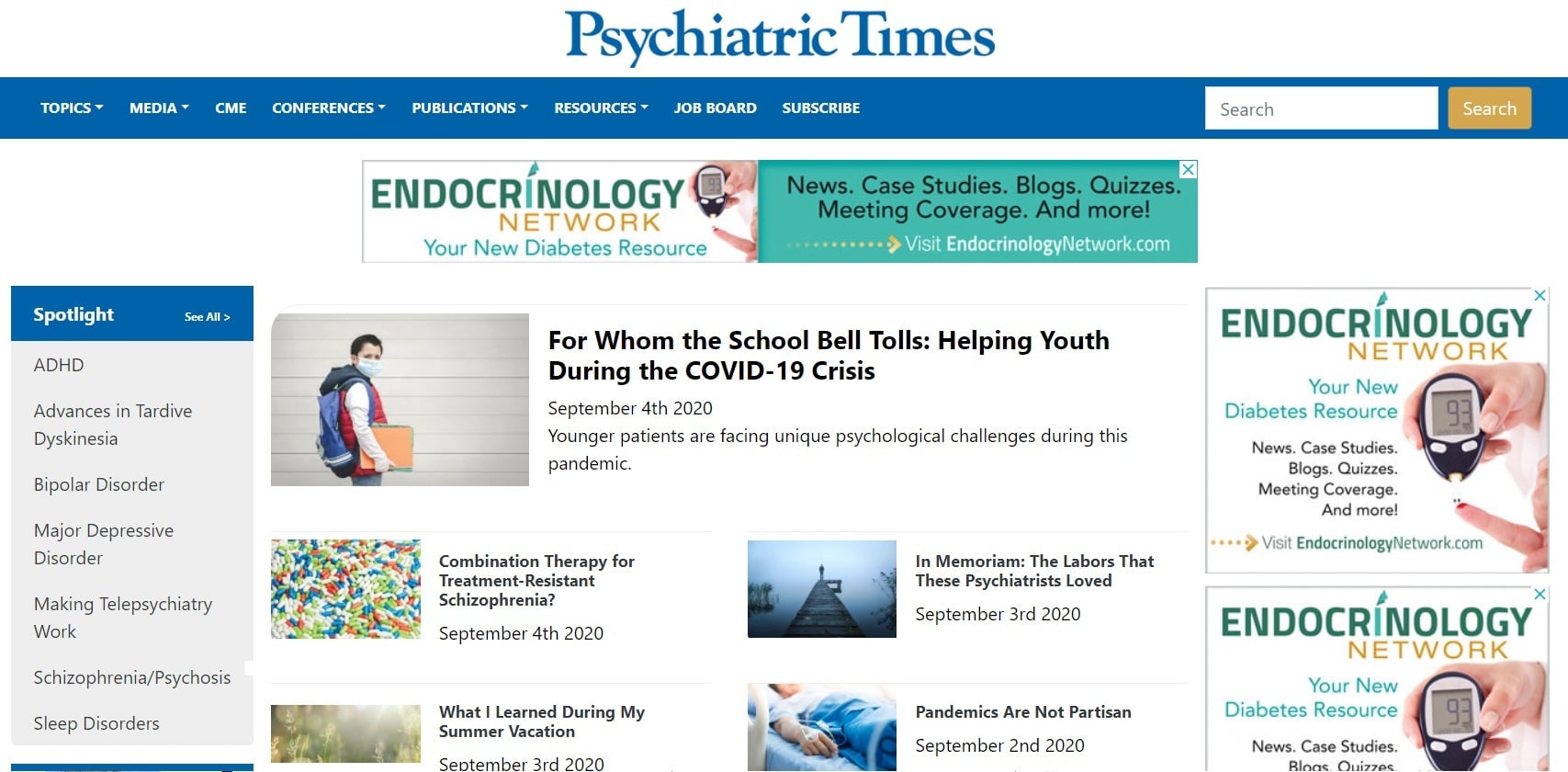
The Psychiatric Times is powered by MJH Life Sciences, a medical media company that offers relevant medical information to a worldwide audience. Initially, it was a 16-page, bi-monthly publication that was distributed to psychiatrists only, but when it reached the online world, it became available to everyone.
As one of the leaders in providing mental health information, this website offers a wide range of news and threads. It is dedicated to being the go-to resource for mental health care professionals (and even ordinary people), and has a reputation for being timely and practical.
When you visit the site, you’ll find several different articles ranging from simple post contributions to peer-reviewed, in-depth case reports and research studies. The site also covers conference coverage, treatment information, and a multitude of perspectives from different experts in the field.
Although the publication was started years ago (in 1985), it clearly hasn’t lost its style as it continues to adapt to the modern world. With the website’s clean and uncomplicated interface, readers of all ages and levels can find interesting content.
10. Medical News Today

Healthline Media aims to provide useful, credible information to its readers regarding health and wellness. It seeks to create a stronger and healthier world by disseminating health information in the most effective and efficient manner.
Medical News Today is a product of Healthline Media (along with Greatist, Healthline, and Parenthood). It claims to be one of the “fastest-growing health information sites,” with over 70 million viewers and readers. As such, it is always up to date with the most recent technological advances in the field of medicine.
What is rather impressive about this site is its way of presenting medical information, which is very detailed and organized. However, it is important for readers to remember that if they are experiencing symptoms, they still need to go and personally see a health professional for a more accurate diagnosis.
11. IQ’s Corner

As its tagline (“Intelligent insights on intelligence theories and tests”) suggests, this website is focused on cognition and mental health. It was founded by Dr. Kevin McGrew in an attempt to help people understand how “intelligence” works, and how it applies in psychology.
Dr. McGrew is the director of the Institute for Applied Psychometrics (IAP). He practiced school psychology for nearly 12 years, and then began teaching applied psychology at St. Cloud State University for 10 years. Currently, his focus is on this blog and the IAP.
The blog’s main purpose is to explore the link between “intelligence theory and the applied practice of intelligence testing.” Dr. McGrew’s interest lies in the Cattell-Horn-Carroll (CHC) Theory of Human Cognitive Abilities, and how all other CHC assessment types emerge from it. He aims to find the ultimate answer to how cognitive intelligence affects our day-to-day activities and accomplishments.
IQ’s Corner is a technical blog that mostly consists of research and case studies. If you enjoy scientific research, then this could be a great fit.
12. Leiden Psychology Blog
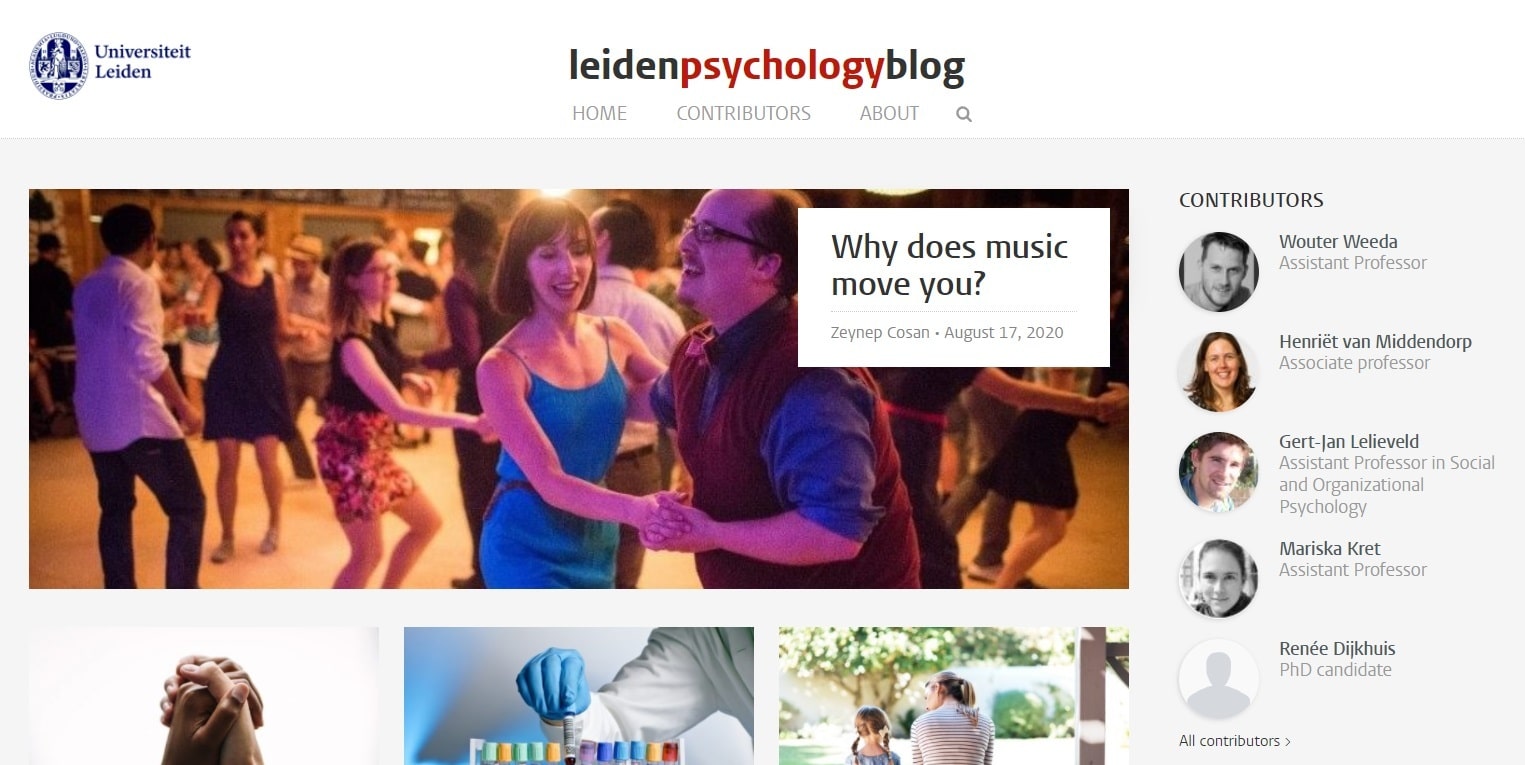
Leiden University in the Netherlands is the powerhouse behind this influential blog. It is part of the university’s Institute of Psychology and Faculty of Social and Behavioural Sciences, and features topics ranging from the most basic fundamentals of psychology to the most complex. Some of the categories include child and developmental psychology, clinical psychology, and cognitive neuroscience.
This blog usually features research and case studies that the institute carries out. However, it also covers matters and issues that are beyond the purview of the university, but still well within the bounds of psychology. For instance, one article talks about racism and discrimination among family members.
The blog has a lot of writers and contributors, and they are mostly psychologists, researchers, professors, and experts in their fields. Some are students who are candidates for master’s degrees and PhDs.
We recommend the Leiden Psychology Blog for those who want a solid reference on psychology, human behavior, and cognitive development. If you are looking for a site that quickly responds to social and current events from a psychological perspective, then this is the right place.
13. NeoAcademic
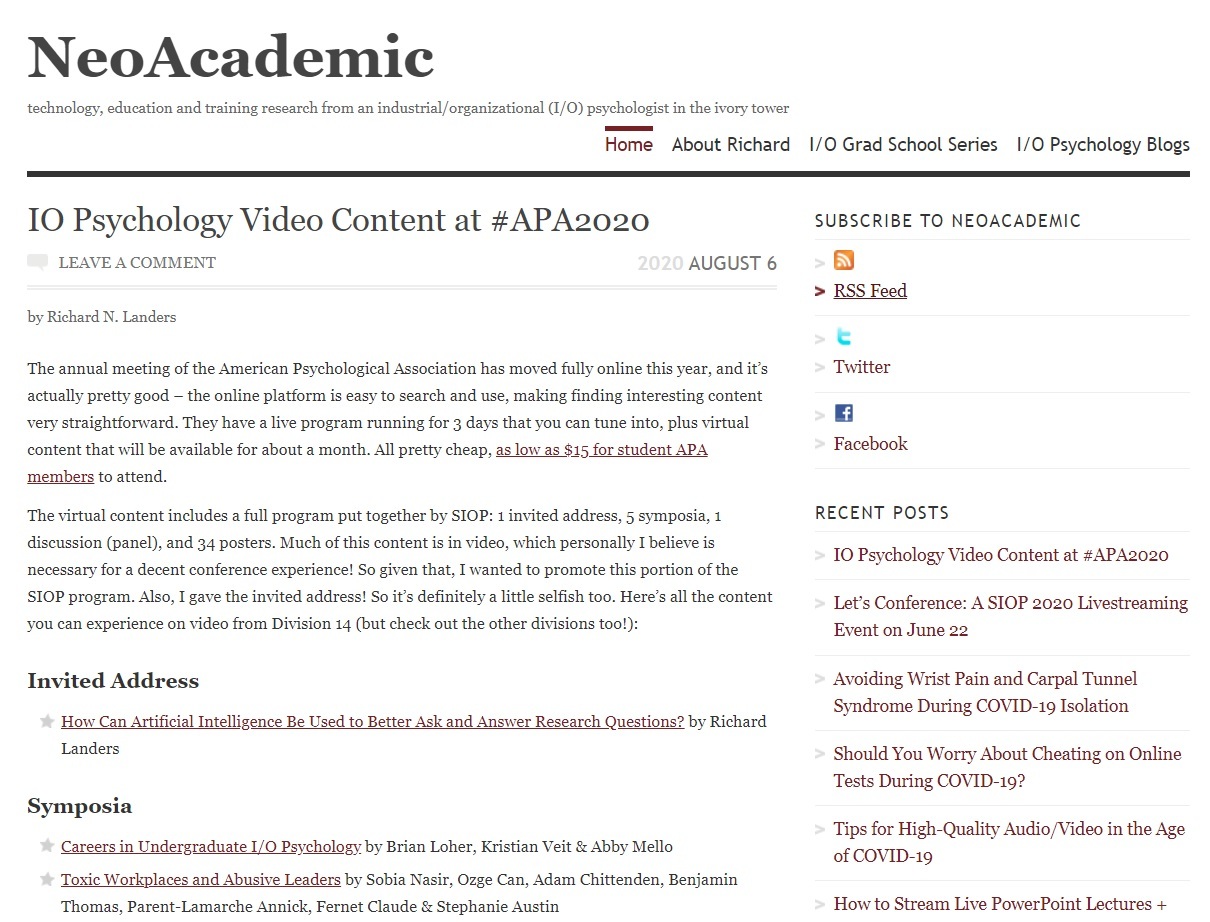
NeoAcademic is owned and operated by Richard Landers, an industrial-organizational psychology expert who shares his knowledge and experience through teaching and blogging. He has been awarded the title of John P. Campbell Distinguished Associate Professor by the Industrial-Organizational Psychology Department of the University of Minnesota, and his blog is currently one of the best places to go to when it comes to I/O psych.
According to Landers, the blog is primarily a medium to provide live coverage of the seminars, conferences, and other events he attends. It is also where he shares his current research in I/O psych and technology applied in the workplace. As his tagline suggests, the blog is all about “technology, education, and training research from an I/O” perspective.
Landers is also a tech developer and a computer genius. Hence, you will find in his blog a good blend of psychology applied to the modern world. His focus includes social media, gamification, and virtual reality, and he connects all these to psychology and how it can be adapted and applied to the workplace.
I/O psych has been described by the American Psychological Association as the branch of psychology that deals with the study of human behavior in organizations and the workplace. It is one of the more contemporary branches of psychology, and continues to evolve and emerge as time passes.
14. Psychology in Action

Psychology in Action (PIA) was originally an organization formed by doctoral students at the University of California, Los Angeles (UCLA). Its primary goal is to increase public awareness of mental health and psychological developments. It seeks to explain psychology to those who are not yet part of the community, or who are unaware of the basics of the field.
The blog was established by Adi Jaffe in 2008 as a platform where students could share their research publicly. It continued to expand, and had developed a wide readership by 2010, when it became a main hub for community events and interdisciplinary symposiums. While the blog is operated by UCLA graduate students, they receive a huge amount of help from Dr. Jaana Juvonen, a faculty member at the same university.
PIA believes that psychological concepts and research are not just for psychologists, clinical practitioners, and other experts in the field. We recommend Psychology in Action to anyone who wants to learn more about psychology and its recent trends. The blog has a light vibe and is easy to read and comprehend.
15. The Positive Psychology People

The Positive Psychology People website was launched and established in 2015 by a group of individuals who believe that positive psychology can have a significant impact on people’s lives. It started as a means to provide current and future students with resources and information about psychology and its various branches.
As time went by, however, the group began to create more specific goals. These include spreading positivity all over the globe and encouraging people to practice positive psychology.
More specifically, the blog aims to inspire, entertain, and educate people on how to apply positive psychology to live healthier, happier, and more meaningful lives. It doesn’t matter if you are not that knowledgeable about positive psychology, because this blog helps you learn about the discipline. All it takes is determination to create that positive change you’ve been seeking.
The Positive Psychology People website uses the hummingbird as a logo. This is because a hummingbird symbolizes strength and resilience.
16. National Institute of Mental Health
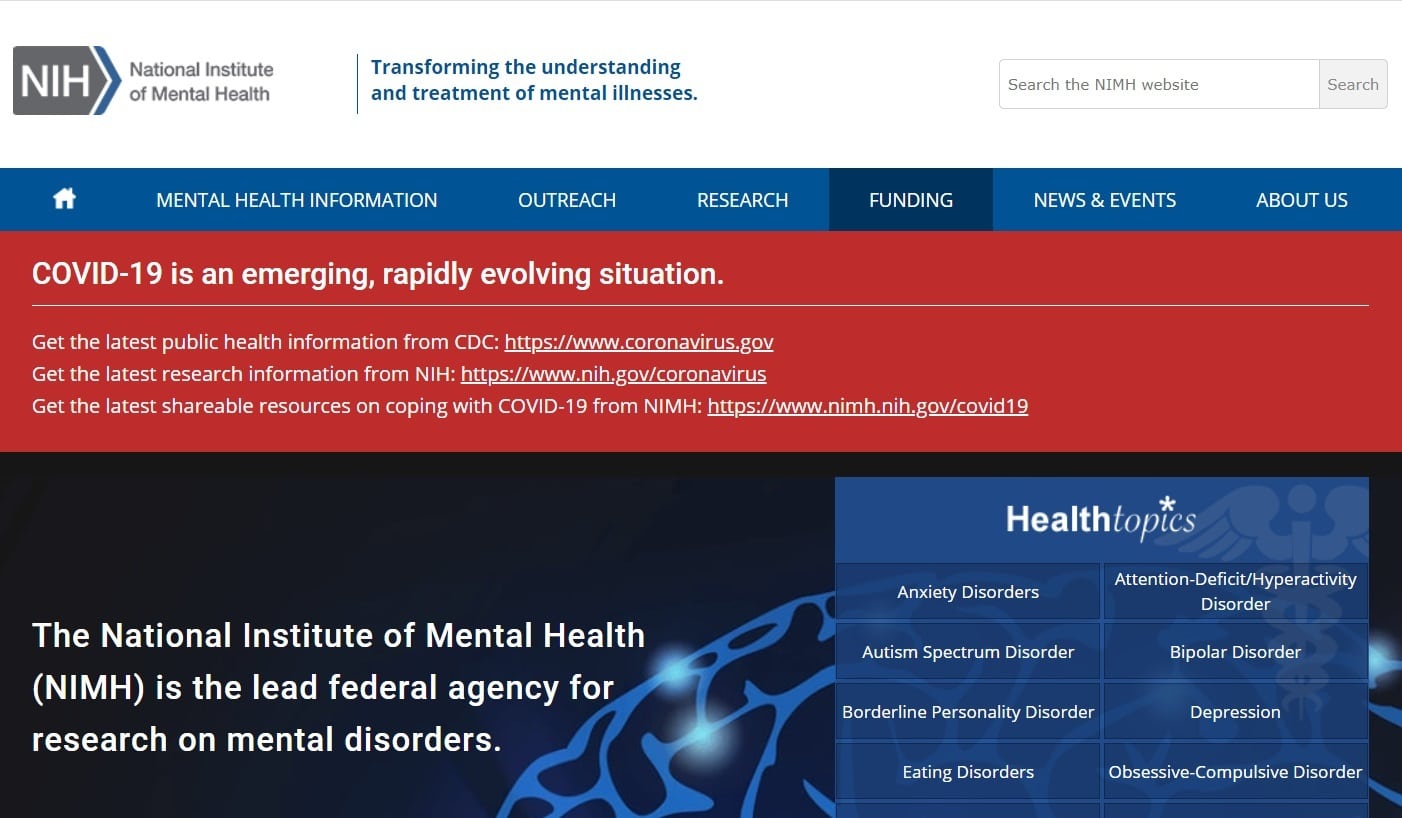
The National Institute of Mental Health (NIMH) is one of the leaders when it comes to Internet-based mental and psychological health information resources. One of the centers of the National Institutes of Health (NIGH), it is the head federal agency governing research and experiments related to mental disorders.
The NIMH “envisions a world in which mental illnesses are prevented and cured.” Its mission is to “transform the understanding and treatment of mental illnesses through basic and clinical research, paving the way for prevention, recovery, and cure.”
The NIMH seeks to spread awareness among different cultures and people about the fundamentals of psychology and mental health. It is not just about providing the right information to people, but also offering solutions for addressing mental health discrimination.
17. The American Psychological Association
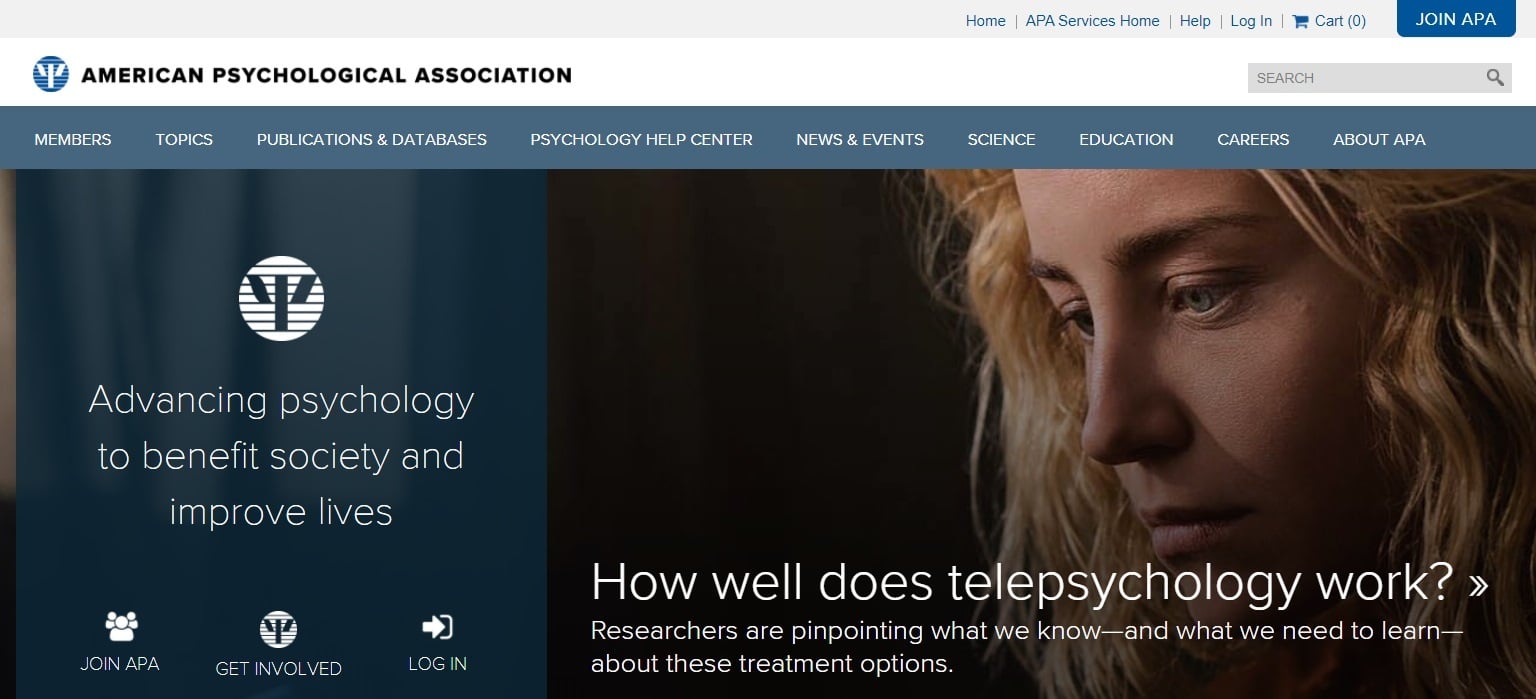
The American Psychological Association (APA) seeks to grow and evolve the paractice of psychology for the betterment of society. The APA is the leading scientific and professional psychological association in the United States
According to its website, the APA’s mission is to uphold and promote the “advancement, communication, and application of psychological science and knowledge” to the benefit of society at large. It offers a strategic plan to help American citizens utilize psychology as a means to create a positive impact in their lives.
The APA develops new plans and features to progress the profession. It keeps track of the past, present, and future trends to provide the best possible service to people, and offers educational courses, grants and funding, and standards and guidelines to support the entire psychological industry.
If you are looking for a psychology website that has it all, then the APA is your best bet. As the country’s official representative in the field, it is always updated and the sources are always legitimate.
18. We’re Only Human
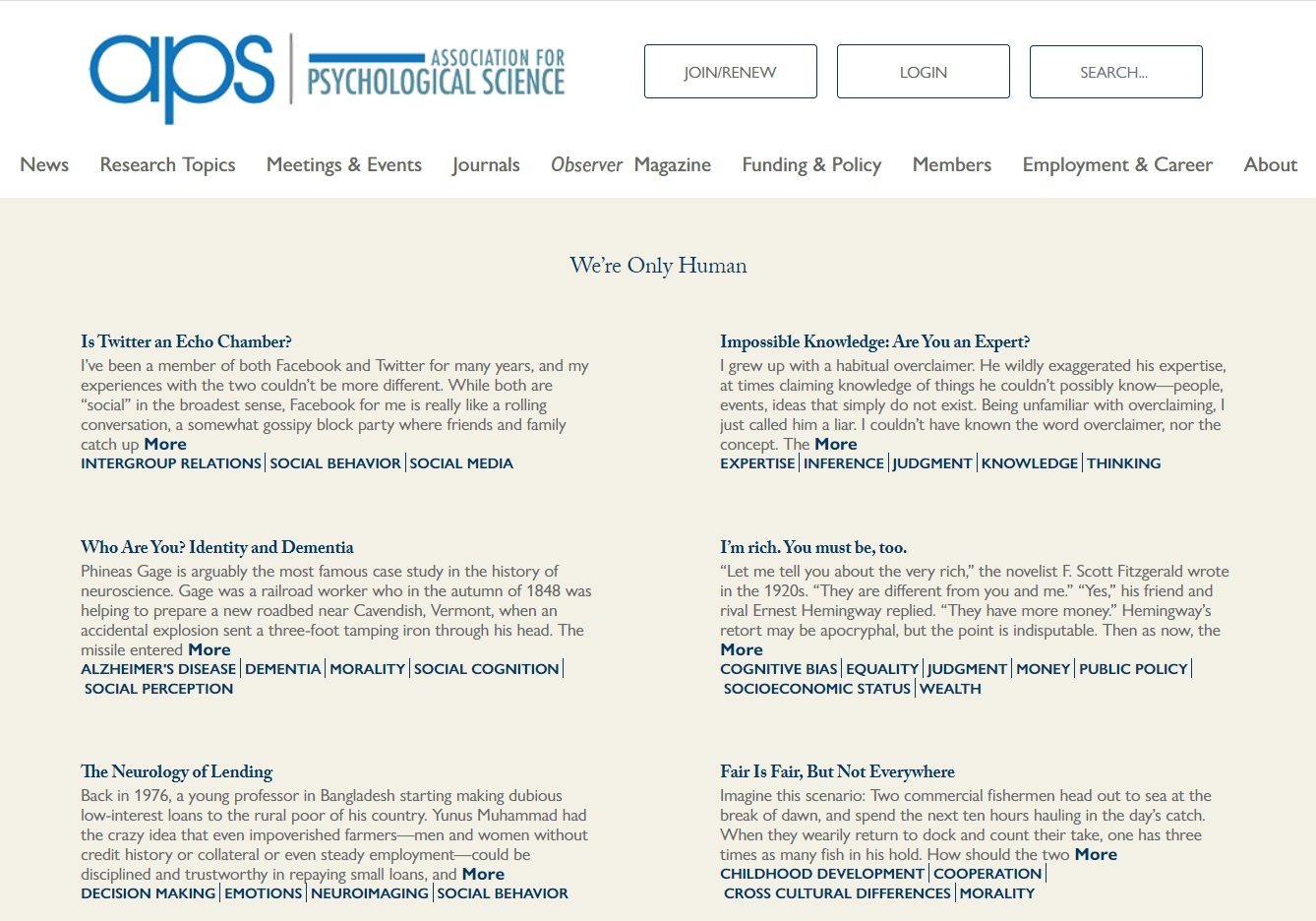
We’re Only Human is a subdivision of the Association for Psychological Science (APS) that focuses on psychology and other humanities. The APS is one of the leading organizations when it comes to progressing psychology on the international level. Its main purpose is to provide support to psychology scientists by providing a platform where they can publish their research and articles.
In addition, the APS aims to promote awareness of the field of psychology on a grander scale. It advocates for increased support and investment into research and public policy, and also encourages global communication among experts and professionals in the field.
We’re Only Human is a mixture of articles and journals about the different aspects of psychology. These articles are from various writers and professionals who wish to share their experiences about specific mental and emotional health subject.
We recommend this blog to anyone who’s feeling a little low at the moment. You can find inspirational, true-to-life stories from those who have experienced first-hand the struggles of having a mental health illness or emotional breakdown.
19. Psychreg
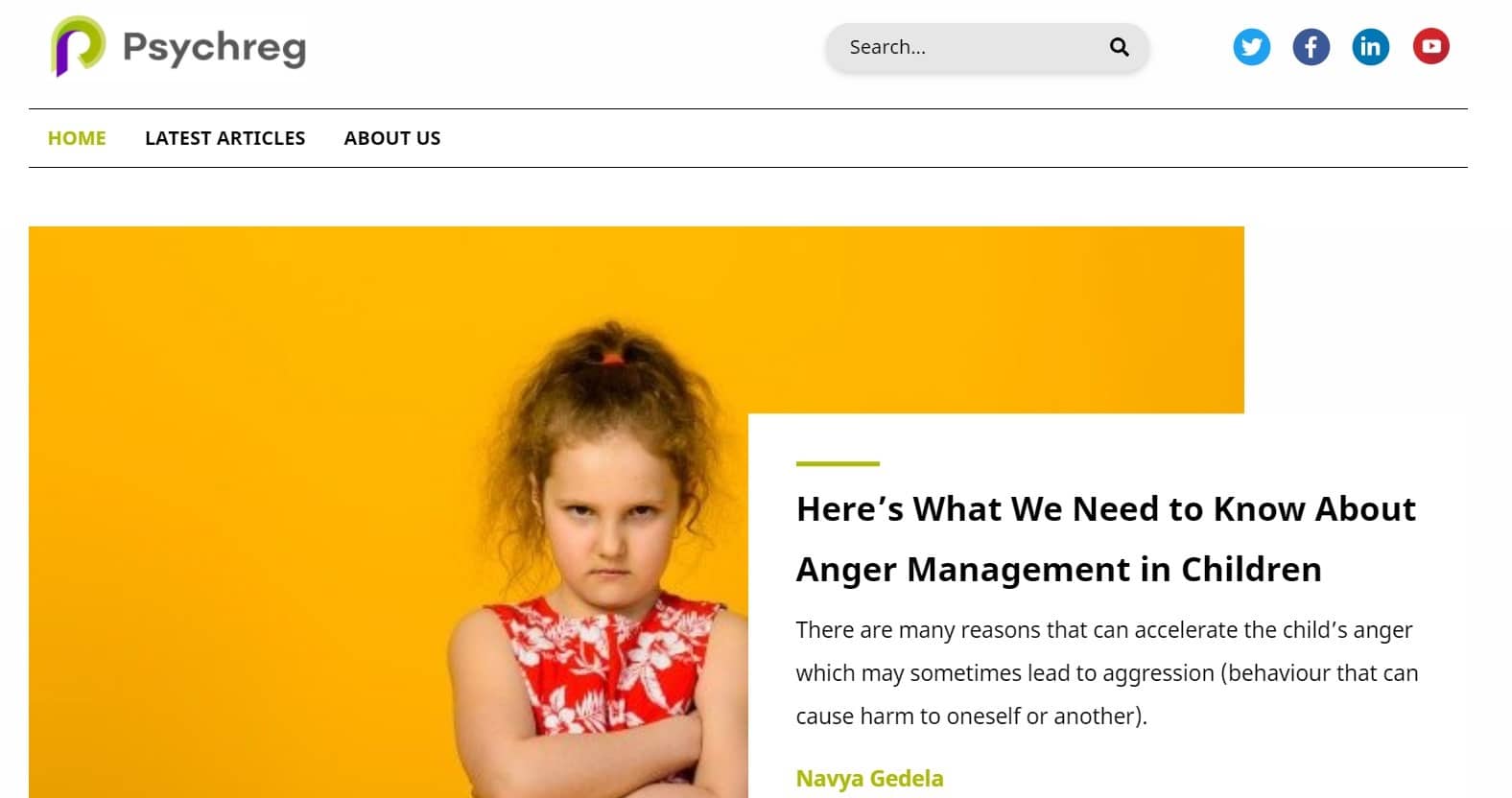
Launched in 2014 by Dennis Relojo-Howell, Psychreg was initially a directory of people who shared an interest in psychology, but has grown into a platform where you can find tips, guidelines, and information about psychology and all other branches of science related to it.
What makes this blog unique is that it has a different approach compared to other blogs and websites. It has a playful tone and is easy to read and understand. Moreover, it offers other platforms like a podcast and an open-access journal where you can find various writings and musings from experts in the field.
Additionally, the blog publishes mental health stories from real people to inspire others who are experiencing similar situations. It also hosts events and provides useful resources to keep people informed about the recent trends in psychology.
According to the site, the word “Psychreg” is a combination of the words “psychology” and “registry.” As indicated earlier, the blog started as a directory, hence the name.
20. The Mousetrap
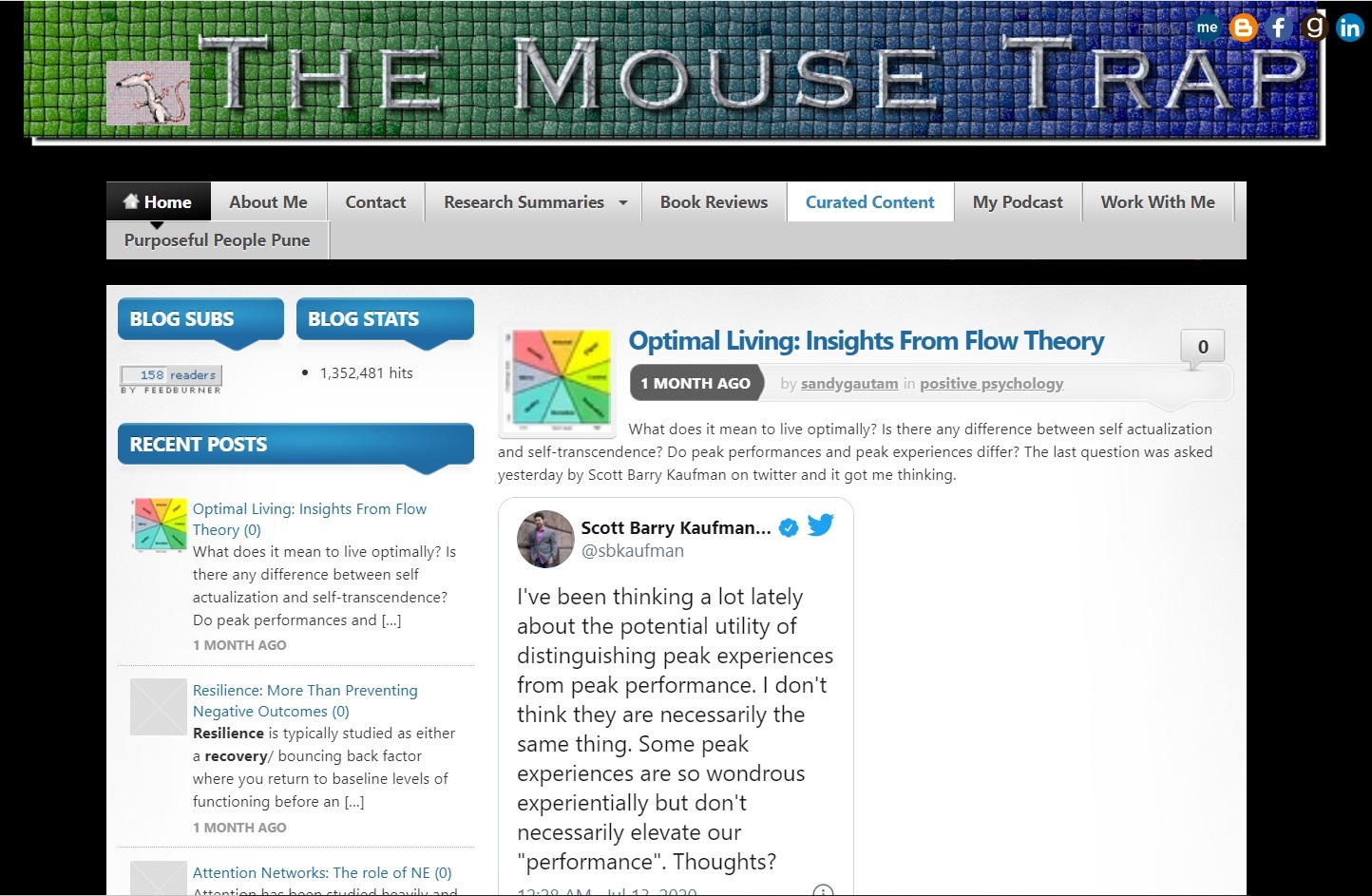
The Mousetrap is a personal blog owned and operated by Sandeep Gautam, a Gallup-certified strengths coach, leadership mentor, and workshop facilitator. He is the global representative of India for the International Positive Education Network (IPEN), and is known for his passion and dedication to positive psychology and education.
Gautam was initially a software development genius. As time went by, he realized his passion lay in human philosophy and psychology. His love for software and computers evolved into devotion for neuroscience and basic human instincts. He ultimately followed this calling and started the Mousetrap blog.
The blog is a compilation of Gautam’s musings, realizations, life experiences, and philosophical beliefs—all of which are, of course, related to the human mind and behavior. He also curates content, writes book reviews, and creates research summaries. He also has a podcast if you are more of a listener than a reader.
The Mousetrap blog has been featured on a lot of psychology and neurosciences websites, including Psychology Today. The blog interface is simple and very traditional, but the content is really unique, and there is a lot to learn from it.
Conclusion
While psychology is interesting and fun to learn, it can also be complicated. As you probably know, it has so many sub-branches, and its trends are always changing. Hence, a good guide like a psychology blog or website can be a great tool to help you understand it better.
The human mind is complex. It is full of wonders and beauty, yet is intricate and difficult to understand. But with the help of psychology, you can learn a lot about yourself and your fellow humans.
